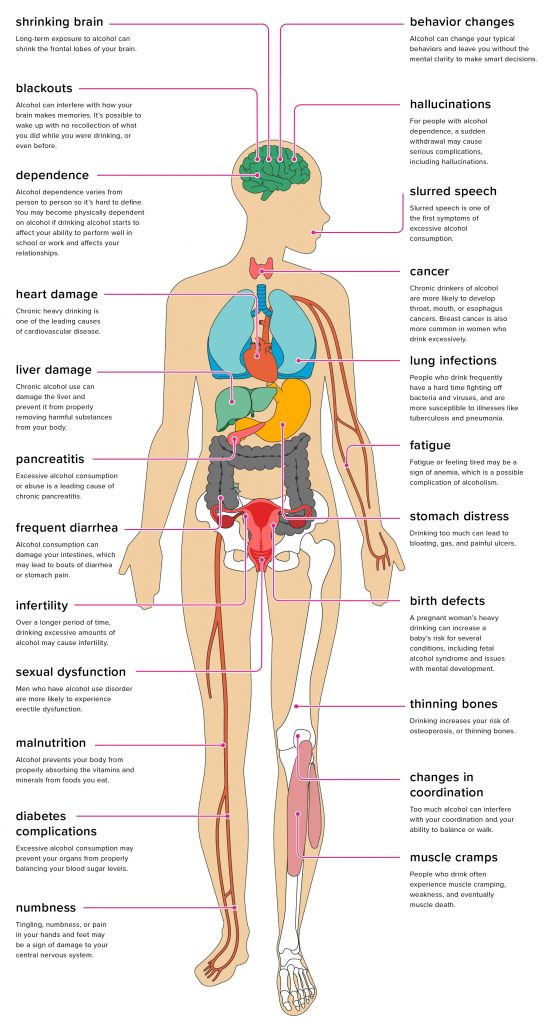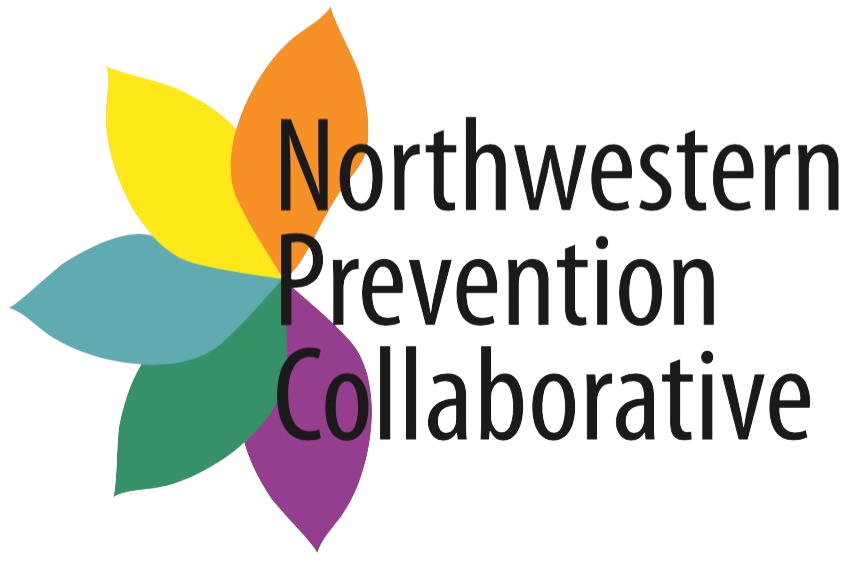Alcohol’s impact on your body starts from the moment you take your first sip. While an occasional glass of wine with dinner isn’t a cause for concern, the cumulative effects of drinking wine, beer, or spirits can take its toll.
Read on to learn the effects of alcohol on your body.

A glass a day may do little damage to your overall health. But if the habit grows or if you find yourself having a hard time stopping after just one glass, the cumulative effects can add up.
Digestive and endocrine glands
Drinking too much alcohol can cause abnormal activation of digestive enzymes produced by the pancreas. Buildup of these enzymes can lead to inflammation known as pancreatitis. Pancreatitis can become a long-term condition and cause serious complications.
Inflammatory damage
The liver is an organ which helps break down and remove harmful substances from your body, including alcohol. Long-term alcohol use interferes with this process. It also increases your risk for chronic liver inflammation and liver disease. The scarring caused by this inflammation is known as cirrhosis. The formation of scar tissue destroys the liver. As the liver becomes increasingly damaged, it has a harder time removing toxic substances from your body.
Learn more about alcohol-related liver disease »
Liver disease is life-threatening and leads to toxins and waste buildup in your body. Women are at higher risk for developing alcoholic liver disease. Women’s bodies are more likely to absorb more alcohol and need longer periods of time to process it. Women also show liver damage more quickly than men.
Sugar levels
The pancreas helps regulate your body’s insulin use and response to glucose. When your pancreas and liver aren’t functioning properly, you run the risk of experiencing low blood sugar, or hypoglycemia. A damaged pancreas may also prevent the body from producing enough insulin to utilize sugar. This can lead to hyperglycemia, or too much sugar in the blood.
If your body can’t manage and balance your blood sugar levels, you may experience greater complications and side effects related to diabetes. It’s important for people with diabetes or hypoglycemia to avoid excessive amounts of alcohol.
Central nervous system
One of the easiest ways to understand alcohol’s impact on your body is by understanding how it affects your central nervous system. Slurred speech is one of the first signs you’ve had too much to drink. Alcohol can reduce communication between your brain and your body. This makes coordination more difficult. You may have a hard time balancing. You should never drive after drinking.
As alcohol causes more damage to your central nervous system, you may experience numbness and tingling sensations in your feet and hands.
Drinking also makes it difficult for your brain to create long-term memories. It also reduces your ability to think clearly and make rational choices. Over time, frontal lobe damage can occur. This area of the brain is responsible for emotional control, short-term memory, and judgement, in addition to other vital roles.
Chronic and severe alcohol abuse can also cause permanent brain damage. This can lead to Wernicke-Korsakoff syndrome, a brain disorder that affects memory.
Dependency
Some people who drink heavily may develop a physical and emotional dependency on alcohol. Alcohol withdrawal can be difficult and life-threatening. You often need professional help to break an alcohol addiction. As a result, many people seek medical detoxification to get sober. It’s the safest way to ensure you break the physical addiction. Depending on the risk for withdrawal symptoms, detoxification can be managed on either an outpatient or inpatient basis.
Symptoms of alcohol withdrawal include:
Seizures, hallucinations, and delirium may occur in severe cases of withdrawal.
Digestive system
The connection between alcohol consumption and your digestive system might not seem immediately clear. The side effects often only appear after there has been damage. And the more you drink, the greater the damage will become.
Drinking can damage the tissues in your digestive tract and prevent your intestines from digesting food and absorbing nutrients and vitamins. As a result, malnutrition may occur.
Heavy drinking can also lead to:
For people who drink heavily, ulcers or hemorrhoids (due to dehydration and constipation) aren’t uncommon. And they may cause dangerous internal bleeding. Ulcers can be fatal if not diagnosed and treated early.
People who consume too much alcohol may also be at risk for cancer. People who drink frequently are more likely to develop cancer in the mouth, throat, esophagus, colon, or liver. People who regularly drink and use tobacco together have an even greater cancer risk.
Circulatory system
Alcohol can affect your heart and lungs. People who are chronic drinkers of alcohol have a higher risk of heart-related issues than people who do not drink. Women who drink are more likely to develop heart disease than men who drink.
Circulatory system complications include:
- high blood pressure
- irregular heartbeat
- difficulty pumping blood through the body
- stroke
- heart attack
- heart disease
- heart failure
Difficulty absorbing vitamins and minerals from food can cause anemia. This is a condition where you have a low red blood cell count. One of the biggest symptoms of anemia is fatigue.
Sexual and reproductive health
You may think drinking alcohol can lower your inhibitions and help you have more fun in bed. But the reality is quite different. Men who drink too much are more likely to experience erectile dysfunction. Heavy drinking can also prevent sex hormone production and lower your libido.
Women who drink too much may stop menstruating. That puts them at a greater risk for infertility. Women who drink heavily during pregnancy have a higher risk of premature delivery, miscarriage, or stillbirth.
Women who drink alcohol while pregnant put their unborn child at risk. Fetal alcohol syndrome disorders (FASD) is a serious concern. Other conditions include:
- learning difficulties
- long-term health issues
- increased emotional problems
- physical development abnormalities
Skeletal and muscle systems
Long-term alcohol use may prevent your body from keeping your bones strong. This habit may cause thinner bones and increase your risk for fractures if you fall. And factures may heal more slowly.
Drinking alcohol may also lead to muscle weakness, cramping, and eventually atrophy.
Immune system
Drinking heavily reduces your body’s natural immune system. This makes it more difficult for your body to fight off invading germs and viruses.
People who drink heavily over a long period of time are also more likely to develop pneumoniaor tuberculosis than the general population. About 10 percent of all tuberculosis cases worldwide can be tied to alcohol consumption. Drinking alcohol also increases your risk for several types of cancer, including mouth, breast, and colon. Click here to learn the basics of alcoholism. You can also read about the stages of alcoholism and recognizing an addiction.

